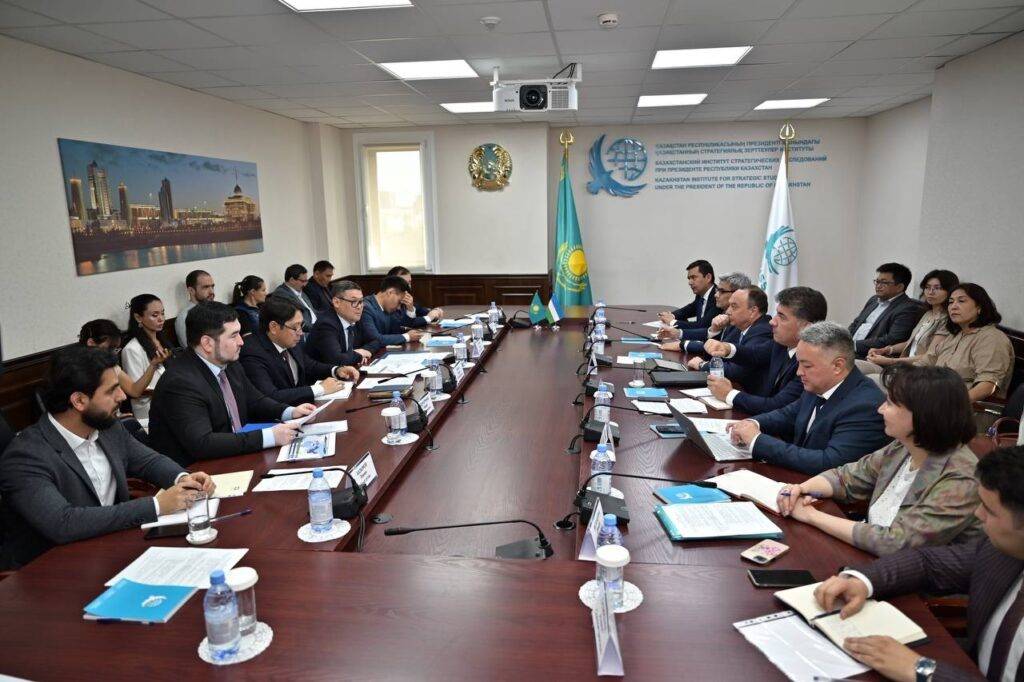Akramjon Nematov: Maintaining and developing strategic dialogue between Uzbekistan and Kazakhstan is the imperative of the times

This was stated by the First Deputy Director of the Institute for Strategic and Regional Studies under the President of the Republic of Uzbekistan Akramjon Nematov, speaking at the first meeting of the Uzbekistan – Kazakhstan Expert Council, which took place on August 2 in Astana.
The event, organized by the ISRS jointly with the Kazakhstan Institute for Strategic Studies under the President of the Republic of Kazakhstan, was attended by the leadership and representatives of ministries and agencies and expert and analytical circles of the two countries.
According to him, the world is experiencing a deep, complex crisis today. The system of international relations has entered a period of prolonged uncertainty.

We are witnessing a growing deficit of trust and multilateral dialogue and a decrease in the effectiveness of international institutions. The world is again being divided into political and economic blocs. These processes are accompanied by fragmentation of the global economy and market volatility.
As a result, global supply chains have become less stable, protectionist measures are increasing, inflation remains high, and countries’ resources to solve global problems are depleted.
The expert believes that combining these factors leads to increased socio-political tensions and, consequently, to an increase in traditional and non-traditional threats.
At the same time, according to A. Nematov, the characteristic feature of the coming years will be the unpredictability of the external environment and its rapid volatility. Already today, against the backdrop of global and regional crises, trade tensions, and tightening financing conditions, there is an outflow of capital from developing countries.
Moreover, the increase in conflicts and humanitarian crises, combined with the declining effectiveness of international humanitarian cooperation, further exacerbates the problem of access to international technical assistance.
This will, in turn, hinder our efforts to ensure the region’s sustainable development. It already complicates the solution of important problems such as energy, food, and water security, which are becoming even more acute today.
According to the ISRS representative, in these difficult conditions, Uzbekistan and Kazakhstan face a very important task – to demonstrate in practice the spirit of allied relations, ensure readiness to jointly solve regional problems, and bear responsibility for the prosperity and sustainable development of the region.
That is why regional cooperation, according to Mr. Nematov, remains the only viable option for eliminating the most severe security risks and ensuring our countries’ sustainable development.
“We need to jointly form a capacious interconnected market in the region, a barrier-free space for free trade, production, and technological cooperation, integrate it into global value chains, transform our region into an important link in interregional connectivity, and increase its competitiveness”, the expert emphasized.
It was noted that the imperative of the region-wide policy should remain Central Asia’s openness to the world and its constructive interaction with external actors.
In this context, the policy of active participation in integration associations in Eurasia, coupled with the implementation of a policy of openness and maintaining balanced relations with all extra-regional actors, will contribute to the transformation of the region into an important trans-regional transport, logistics, production, and technological hub of the global economy.
In addition, Mr. Nematov emphasized the importance of transforming all economic sectors to digital platforms and promoting the creation of a single e-commerce platform based on the adoption of a regional program.
The expert expressed confidence that developing digital infrastructure will increase the transparency of procedures and the efficiency of governance institutions, reduce corruption, and, in general, contribute to creating a more favorable investment climate.
In addition, it was emphasized that the Central Asian countries need to develop consolidated approaches to ensuring food and water security. According to the ISRS representative, “This requires the adoption of a Regional Strategy for Food Security and a Strategy for the Rational Use of Water Resources of Transboundary Watercourses”.
“In turn, to solve the problem in the transport and logistics sectors, it is proposed to adopt a Strategy for Regional Transport Corridors in Central Asia, adopt a Regional Program for Sustainable Development of the Central Asian Transport System, and form a Regional Council for Transport Communications of the Central Asian Countries to coordinate interaction in the development of the transport and logistics sector in the region”, the expert noted.
Special attention was paid to the need for close coordination of security efforts, which is even more relevant in the global economic crisis and the tough confrontation of various centers of power.
Considering this, Mr. Nematov pointed out the importance of joint work on developing a common vision of regional security, considering the inextricable link between security and sustainable development, and determining the central role and responsibility of our states in ensuring the common and indivisible security of Central Asia.
According to the expert, today, there is a reassessment of Central Asia’s role and place in the system of international relations and global economic ties. Central Asia’s enormous human, resource, raw material, and production potential is already attracting the international community’s attention, and the region’s international subjectivity and role on the world stage are growing.
“In these conditions, maintaining and developing a strategic dialogue based on the principles of alliance is the imperative of the times. I am confident that the implementation of the above measures, as well as the coordination of our actions, will allow us to fully utilize the region’s internal reserves and significantly increase the stability of Central Asia”, the ISRS representative summarized.






